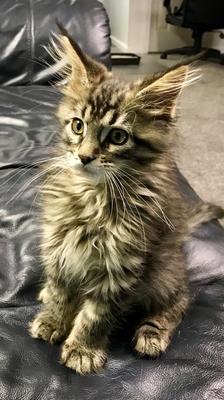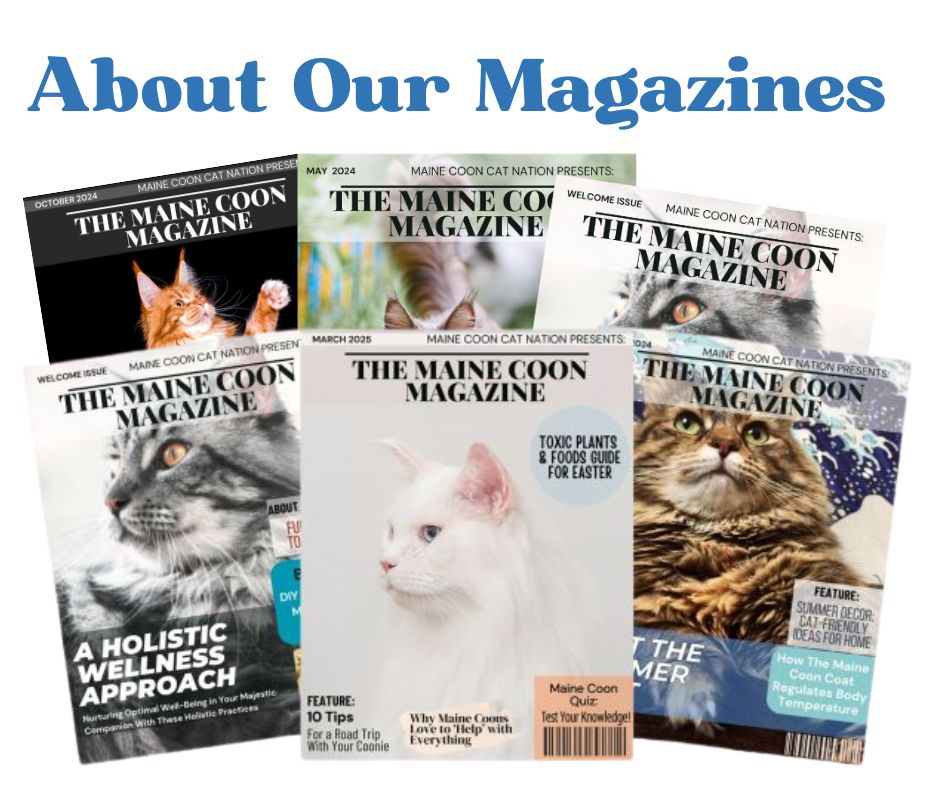- Home
- Maine Coon Cat Health
- Neuter/Spay Questions
Neutering and Spaying Kittens
by: The Maine Coon Cat Nation Community!
Neutering and spaying questions - when to do it, whether it affects the eventual size of a male, I.V.'s and more.
Here are our community questions and answers related to neutering and spaying. Just scroll down to read more about:
 Baby Zeke
Baby Zeke
Consequences of Neutering a Male Maine Coon Early
by BZ
(Florida)
Hey,
I have a Maine Coon MALE cat – currently he’s exactly 1 year, 1 month and 8 days old.
He weighs between 16.8 pounds – he’s not very muscular. My vet said Maine Coons aren’t a muscular breed – but online says otherwise.
He is NOT overweight – barely has a pouch on his tummy. HOWEVER – he will eat everything until it’s done!!!!
If I left kibble out he’d be overweight overnight. I feed him grain free canned food 98% of the time. I got him from Poland when he was 4 months old.
My question/concern is – he was neutered when his “eggs” (yes the word used! hahaha) were found???
So he was neutered at 3 months and 9 days – which I realize is probably very very young! I read online that cats should not be spayed/neutered before 6 months.
So it made me question – what are the consequences of fixing a male cat earlier? Looks like their Urethra would be smaller.
So that puts them at a higher risk of kidney stones correct? What other health concerns?
How about less serious stuff such as size (since that’s important but not vital to a Maine Coon).
Thanks!!
Comments:
Nothing like a Maine Coon companion
by: Opal
My husband bought me a Maine Coon, Horatio, in late 1990's. He, too, has gone over the rainbow with some of your Maine Coons after living 21 years. Yes, he was twenty-one.
We adopted two feral kittens, now one year old.
I love them and am happy to have their companionship, but no other cat will ever replace my smart, dog-like, pushy, playful, loving male Maine Coon.
Shouldn't be an issue
In general, feline advocates have started to try encouraging neutering/spaying a cat at 14 weeks.
The main health issues in regards to neutering to early is blocking of the urethra, obesity, behavioral issues, death while put under, and growth plate fractures.
Overall though, it is always better to get your pet fixed sooner rather than later.
An unfixed male is more likely to get bladder infections, be aggressive, and have poor urination habits.
Not to mention the chance for them to accidentally impregnate another cat if they ever escape.
Consequences of Neutering Maine Coons Early
by: Maine Coons Mom
I've heard that neutering any male cat early can prevent them from growing to their full size.
I've also heard that un-neutered male cats, or those neutered after they were fully mature are more susceptible to urinary tract problems.
My Maine Coon boy was neutered after he matured and he has had the urinary tract issue twice.
But since I eliminated dry food and food high in phosphorus (fish flavors) and started adding water to his food (also got him a water fountain so he drinks more water) he hasn't had it again.
Also he's very muscular and weighs about 19 lbs. I'm not a vet, but this is why I've read. Hope it's helpful.

Purring During Neutering
(UK)
Maine Coon Cat purrs during vet exam and through neutering procedure:
Hi Carrie,
Buddy was neutered on 16/12/10. While he was waiting for me Buddy started to knead his bedding in the carrier; he's never done that before. P'raps he was trying to calm himself?
At the vet he purred loudly through his examination and I was told Buddy continued purring through the short procedure . The vet said in her experience it was very unusual.
I've read purring can be a negative sign also, I wonder if this was the case? Have you or anyone else heard of this Carrie? I'd be interested to find out.
We know when we'll get more snow he cleans right round his right ear and walks with his totally fluffed out!
Reply:
Hi Judy,
Aww, how's he feeling today? At least it's over with!
Leo purred loudly through his first big exam (at around Buddy's age), even through his shots! He was put under anesthesia during the procedure, though.
As for the exam, you know him. He could have been genuinely happy and friendly, like Leo was. It's a Maine Coon thing.
Or, he could have been nervous. Purring in that situation, if he was nervous and scared is also common. You were there during the exam, so you know whether he was scared or friendly by looking at other signals, like rubbing, meowing, etc. as opposed to cowering and flinching.
The procedure and the waiting in his carrier are another story. In his head, the visit went right downhill. He probably used the purring as a healing and self-soothing method, just as you thought.
I wouldn't call it a negative sign, just something they do in what they perceive as negative circumstances. Poor little (big) guy!
In case you've missed it, we have a related article: What Makes a Happy Cat Purr?
Interesting that he foretells the weather! Very cool!
~Carrie
Is an I.V. necessary during a male neutering?
I understand that a having a male kitten neutered is a very quick proceedure. Our new vet is suggesting that we have pre op blood work and he recommends having an IV. Our previous vet never offered these services. I am getting mixed advice as I call around to various other vet clinics.
Reply:
Hi,
Well this is an interesting question. It really dives into the area of medical advice. So, I'll just relay what we've experienced at our vets clinic. I must stress to all future readers, though, this is not medical advice and always seek the professional opinion of your vet!
OK, now: In my experience, every pet I've ever had has always had their blood screened prior to undergoing anesthesia. As I understand it, this is a way to check the functions of the kidneys and organs. It's vital that everything is in top condition internally before subjecting a pet to anesthesia. Not to do so could risk complications.
As for the catheter, I don't know if my pets have had it, but as I understand it, it's a good precaution. It is inserted and used to provide fluid to your pet. This reduces stress on the kidneys and other organs, and it is also a ready conduit in case some emergency occurs and medication needs to be quickly administered.
Again, this is my basic understanding! In my opinion, not all vets you call will say they do the same thing, but the ones that do these things are giving good care and taking every modern precaution.
Best Wishes and
Hoping for a speedy recovery for your little guy!
~Carrie
Comments:
IV & Surgery
by: KC Harloff
It depends on the length of the surgery. Sometimes they can just administer a barbituate and it'll put the cat out long enough to perform the surgery. If the cat is unconscious before getting the IV, they'll not feel a thing.
I'm not in favor of blood draws. The only time my Coon Cat ever tried in his life was when he got a needle in his hind leg for a draw.
When Do I Get My New Kitten Spayed/Neutered?
(Houston, Texas)
I just bought a new Maine Coon kitten. He is approximately six weeks old. When do I get him spayed?
My daughter had one and got him spayed too soon, and he never did lose his desire to hump the other male cat in the house.
I have several other cats and would rather skip this particular visual.
Thank you so much for your answer.
Marti
Reply:
Hi Marti,
First, I should point out that only girl cats are spayed, and boys are to be neutered. So when researching on this you'll want to use the term "neuter."
The traditional age has been 6 months. Although lately there has been a trend toward early spaying and neutering of kittens. This ensures that the procedure is actually carried out, as some owners seem unable to have it done before an accidental litter occurs.
So rescue groups and even some breeders are leaning toward early spaying and neutering. Early spaying and neutering refers to an age as young as eight weeks.
I haven't heard of it resulting in this particular behavior problem. I would guess that it's unrelated to his early neutering. If anything, a cat who is unneutered would be more likely to display that behavior.
Neutering at any age should reduce of eliminate it. Since there are exceptions to every rule, I would guess that in the case of your daughter's cat, it was due more to his character than anything else.
It is very, very rare to find a breeder willing to sell a kitten who is under 12 - 14 weeks of age, much less six weeks of age. This is highly frowned upon.
In any event, you have him now, and you can certainly wait until he is around 6 months old. We did it at about 5 months, since we had a boy and a girl. Just make sure he doesn't go outdoors or come in contact with any un-spayed girl kitties. If you are going to let him out, you can do it early.
I would recommend calling your vet for his expert opinion, as this is more of a medical question, and not as much a 'Maine Coon cat breed' specific question.
All The Best,
~Carrie
Comments:
Spay/Neuter goes by weight now
by: Gail (Quincy, MA, USA)
Working as a volunteer at our local shelter, the trend is not decided by age anymore - it is decided by weight. Once the kitten is a healthy 2 pounds, she/he is ready to be spayed (female) or neutered (male).>
Medical science has made great strides over the years and this change is welcomed in order to get kittens spayed/neutered prior to adoption rather than wait for their new parents to get it done. Our shelter will not release kittens until each and every one is spayed/neutered.
Please do not put off getting your fur kid neutered. Not only will it eliminate unwanted kittens, it will also alleviate a lot of illnesses down the road as your cat gets older.
Maine Coon Cat Growth And Neutering
My Maine Coon cat is 4 years old will it get bigger after he get neutered he weights 8kils?
Reply:
Hi,
Neutering shouldn't have an effect on his size. Some theorize that neutered boys are lazier and this makes them 'fat.'
Others worry that neutering will stunt the growth of their boy and he won't get as big as they'd like him to be.
No need to worry. At four years he's probably full grown. Even if not, neutering won't effect his growth.
All The Best,
~Carrie
Age A Maine Coon Boy Kitten Can Be Safely Neutered Without Harming Normal Growth
A breeder wants to sell me a Maine Coon boy kitten but she plans on neutering him at 3 months of age.
Will this hurt normal physical development?
Reply:
Hi,
No, neutering at three months of age will not harm his normal physical development.
Many breeders are turning to this route to ensure that the kittens they sell will in fact be spayed/neutered. I would think that a breeder who does this has had experience with owners not following through.
You might want to read a recent and very similar visitor question above: When Do I Get My New Kitten Spayed/Neutered? It discusses early spaying/neutering, and a visitor has left a helpful comment regarding the youngest spay/neuter patients.
When I took my two Maine Coon kittens to be spayed and neutered, I asked my vet how it would affect my boy, physically. I wanted a big Maine Coon cat. He informed me that my boy would still be big, but his face/head area would have a slightly more "gentle" appearance, not as square and "manly."
Leo was 5-6 months at the time. I do not know if neutering at 3 months would have any different outcome. I will say that Leo is huge, and has quite a square, large head. The biggest I've ever seen on a cat!
Before committing to this kitten, I think you should call your local vet since you have reservations. This is a somewhat physiological question, regarding a medical procedure. If you don't have a vet yet, any local vet can answer your question with ease. That's what they are there for. It will only take a few moments, and you will have a professional answer, and be ready to proceed (I think) with a breeder you can trust.
All The Best,
~Carrie
Comments:
Male neutering
by: Helen
My vet says that he likes to wait until males are six months old to neuter to insure the uretha is sufficietly large enough to pass crystals in the urine if that problem develops later in life.
I wanted my MCC to have a masculine look so I had planned to wait until he was 8 months old to neuter him. By the time time he was 5 1/2 months old his urine began to stink like a tom cat and I couldn't get to the vet fast enough for the neuter. (HaHaHa) He wasn't marking, but my, oh, my did his urine ever reek of stud cat hormones! Today he looks like a big proud male cat, is knee-high tall and weighs 21 pounds.
My breeder (who is nationally known) allows male kittens to go to new homes after their first set of vaccinations. See if your breeder will reconsider the issue. She is going to mark his papers "Not for Breeding Purposes" anyhow. Why not ask her to hold his papers until you get him neutered and furnish her with your vet's written statement of date of neuter.
Do You Have a Related Cat Question? Ask Us Here!
Do you have a question? Fill out the form below to get an answer! Give us as much information as you can, so we can best understand your unique cat questions!
« Back to Maine Coon Health
Recent Articles
-
Today's Features
Apr 16, 25 09:54 PM
Today we have two classic Memory Lane pages to share!
Murphy & Candy Cane: Double the Maine Coon Charm - This adorable Maine Coon duo from our 2011 Photo Albums - Murphy and Candy Cane - brought doubl… -
Memory Lane Month Begins!
Apr 15, 25 10:22 PM
We're thrilled to start our "Memory Lane Month" event by visiting some cherished moments from our community! We're in the process of restoring meaningful community stories like this one, to preserve t… -
Will a Maine Coon Protect Its Owner From Danger or an Intruder?
Apr 09, 25 10:41 PM
Plenty of people are curious: Will a Maine Coon protect its owner if something happens? Let’s talk about what this means, and what kind of protector a Coonie is.



